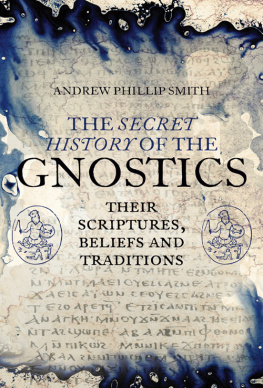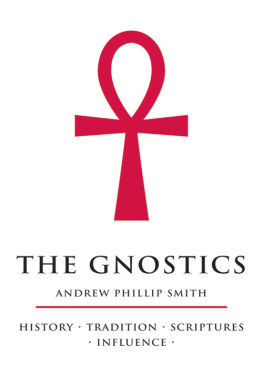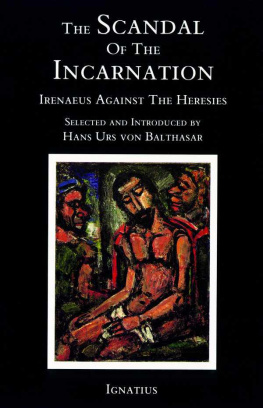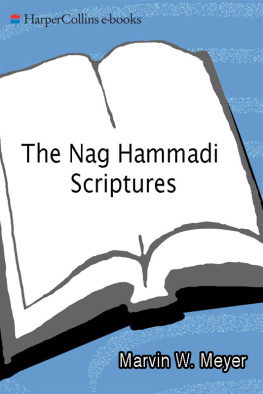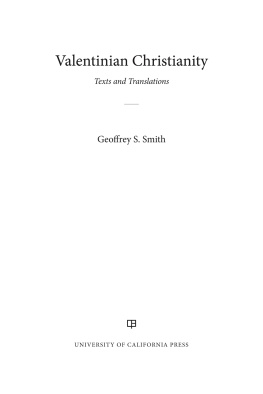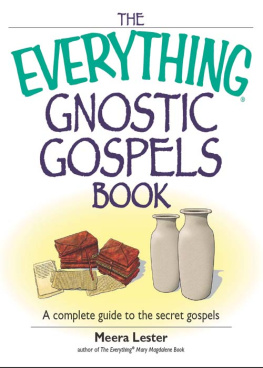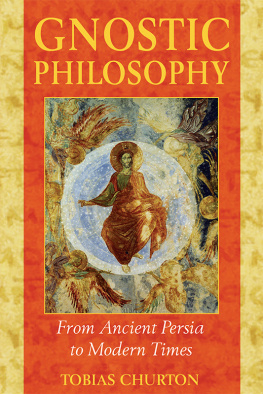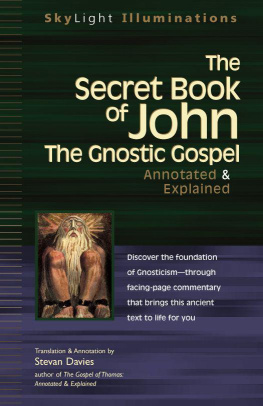Praise for Andrew Phillip Smith
A Dictionary of Gnosticism
A long-awaited and indispensable grammar of classical Gnosticism essential for any serious student, and a practical gem for the curious.
Jordan Stratford, author of Living Gnosticism
A Dictionary of Gnosticism is a valuable resource for any student of Gnosis. If you need a helpful translator of the language, or a sympathetic guide to the beliefs of these extraordinary women and men who lived a long time ago, in a world far, far away, then this is the book for you. Think of it as the Lonely Cosmos Guide to Gnosis, and always pack a copy when you are setting out for that strange and exciting country. Have a great trip!
Timothy Freke and Peter Gandy, authors of The Jesus Mysteries and The Gospel of the Second Coming
The Gospel of Philip
Provides us with a wealth of insightful annotations, and the translation is the most accessible to date. All of those with an interest in Gnostic tradition and its sacraments will be happy to receive this splendid work!
Stephan A. Hoeller, author of Jung and The Lost Gospels and The Gnostic Jung
How refreshing to move from our contemporary culture of Christian literalism to a spiritual world alive with symbol, metaphor and the poetry of the Divine.
Ron Miller, Religion Department chair, Lake Forest College, author of The Gospel of Thomas: A Guidebook for Spiritual Practice
The Lost Sayings of Jesus
If the gospels represent the tip [of Jesuss sayings], Andrew Phillip Smith has provided the rest of the iceberg. Here is proof that [Jesuss] voice has never fallen silent.
Robert M. Price, professor of scriptural studies, Johnnie Colemon Theological Seminary
Marvellous ... Will provide spiritual seekers, committed Christians, and academic scholars [insight into] sayings attributed to Jesus that they may not know existed. A valuable sourcebook and significant contribution to the study of the history of Christian ideas. Stevan Davies, professor of religious studies, College Misericordia and author of The Gospel of Thomas: Annotated & Explained
Gnostic Writings on the Soul
Artful and erudite ... brings these allegories into three-dimensional relief, making them more memorable, accessible, and significant.
Rabbi Elie Kaplan Spitz, author of Does the Soul Survive?
By the same author
The Gospel of Thomas: A New Version Based on its Inner Meaning
The Gospel of Philip: Annotated & Explained
The Lost Sayings Of Jesus: Teachings from Ancient Christian, Jewish, Gnostic and Islamic Sources Annotated & Explained
Gnostic Writings on the Soul: Annotated & Explained
A Dictionary of Gnosticism
The Gnostics: History Tradition Scriptures Influence
The Lost Teachings of the Cathars
The Gnostic: A Journal of Gnosticism, Western Esotericism and Spirituality, 1-6 (editor)
ANDREW PHILLIP SMITH
THE SECRET
HISTORY OF THE
GNOSTICS
THEIR
SCRIPTURES,
BELIEFS AND
TRADITIONS

For my family
This edition published in the UK and USA 2015 by
Watkins, an imprint of Watkins Media Limited
19 Cecil Court, London WC2N 4EZ
Text copyright Andrew Phillip Smith 2008, 2015
Design and typography copyright Watkins Media Limited 2015
Andrew Phillip Smith has asserted his right under the Copyright, Designs and Patents Act 1988 to be identified as the author of this work.
All rights reserved. No part of this book may be reproduced or utilized in any form or by any means, electronic or mechanical, without prior permission in writing from the Publishers.
1 3 5 7 9 10 8 6 4 2
Typeset by Gail Jones
Printed and bound in Finland
A CIP record for this book is available from the British Library
ISBN: 978-1-78028-821-5
wwww.watkinspublishing.com
Contents
Preface
We appear today, to be living in an age of unprecedented confusion and insecurity: a lyric from John Adams opera Nixon in China sums up our situation: We live in unsettled times; who are our enemies, who are our friends? We seem to be cast adrift on a murky sea of contradictions, trying to cling to slippery concepts, like driftwood from some shattered vessel that was supposed to be an ark of conveyance and safety.
Such cultural turmoil is not new however: we are not the first people to ask the questions: Where do we come from, where are we going, what is the nature of this existence we have been cast into? This book introduces us to people much like ourselves, who found themselves living in a time of intense multicultural and philosophical fermentation. As Jewish ideas became known they collided with Greek philosophy as well as mystical interpretations of ancient pagan religions: for those people, like us, there was certainly no shortage of material to draw on. Theirs was a time of uncertainty, complexity and potential confusion that we might find very familiar. Thus a revision and recovery of Gnostic speculation is timely in helping us understand our own predicament. As in our age so full of conspiracy theories eschatological expectations too were rife, but these were only to be dashed time and again leaving many to question the accepted teachings of the emerging orthodoxy.
Like many people I was brought up with the idea that the collection of texts known as The Bible was Gods Word, and so it was the final authority on life itself. Philosophy and speculation were discouraged or even taboo. I found that while I responded positively to some of its content, other parts would worry me deeply, while some sayings seemed mysterious or incomplete as if there might be a hidden subtext I didnt have access to. The question of authority itself was perplexing: who, if anyone, runs the universe? Is this power really beneficent given a world that seems to be full of madness?
I came across the Gnostics though the work of C.G. Jung: while training to be a psychiatric nurse I immersed myself in his writings. Their approach seemed so fresh and vibrant to me after the literalist interpretations of the orthodox, and somehow more human friendly too! Are we really merely pawns in some cosmic gaming between God and the Devil as the Book of Job describes? If so our purpose would consist in Belief Choice and Service. Yet, within one can sometimes hear a quiet little voice that says We can be more than just that: we can experience, we can understand, and above all we can Know. It is this voice that becomes amplified in the writings and teachings Andrew Phillip Smith introduces us to in this book. Here we have a clear and concise an introduction to what can seem a thorny complex and controversial subject: a golden thread though the labyrinth.
Years after I completed my nurse education to my astonishment and delight, I find myself playing keyboards with punk rock band the Damned. One day on tour I was confronted with a real nun, for the first time since my Catholic childhood. Bizarrely she was running the hotel we staying in. Nodding in the direction of the huge crucifix at her waist, I couldnt resist asking her: Given the name of the band I play in, do you think it may prejudice my post-existential condition? She didnt bat an eyelid but replied: Well, its an interesting concept. That was not very reassuring! But then I recall the Gnostic Reversal whereby the role and nature of those considered bad in traditional biblical exegesis: the serpent in the garden, Cain, the Sodomites and maybe even Judas, are re-evaluated in a positive way. That raises the hope that, maybe we too can be afforded some kind of posthumous cosmic rehabilitation.

